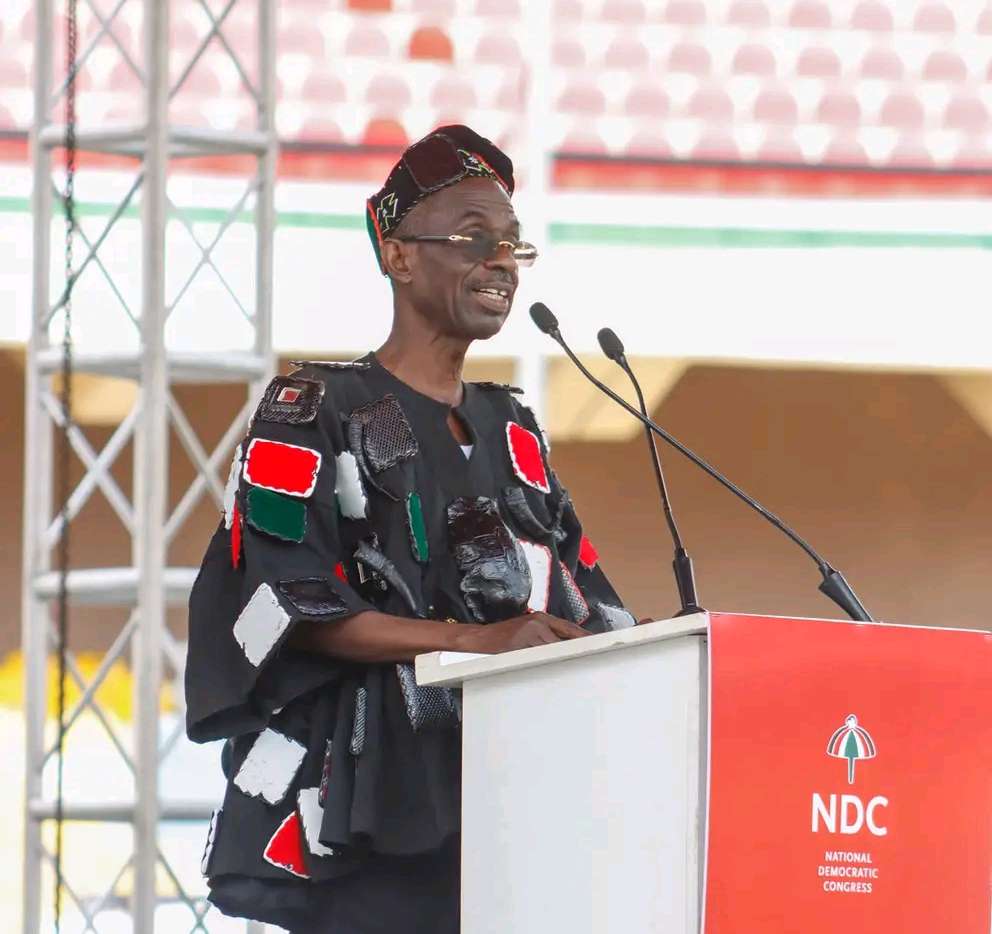In a startling development, prominent Ghanaian lawyer Isaac Minta Larbi has expressed vehement opposition to the lithium agreement between Ghana and an Australian company. This comes in response to statements from the Energy Minister and business magnate Sir Sam Jonah, who have endorsed the deal.
Having thoroughly examined the agreement and engaged in discussions with key figures, including the CEO of the Minerals Commission of Ghana, Martin Ayisi, Lawyer Isaac Minta Larbi remains steadfast in his conviction that the deal is not in the best interest of Ghana and its citizens.
While acknowledging specific provisions highlighted by proponents of the agreement, Larbi contends that these do not address the fundamental flaws he sees in the overall structure.
One notable point of contention is the compulsory Corporate Social Responsibility mandated for the Australian company, which Larbi dismisses as insufficient to outweigh the agreement’s perceived shortcomings.
Lawyer Minta Larbi also argues that Royalty-Based Agreements like the Lithium Deal are inherently disadvantageous, likening them to a “gift” of natural resources to the investor.
Below is his full statement;
THE LITHIUM AGREEMENT WITH THE AUSTRALIAN COMPANY IS NOT THE BEST FOR GHANA AND NEVER IN THE BEST INTEREST OF GHANAIANS.
LAWYER ISAAC MINTA LARBI RESPONDS TO THE ENERGY MINISTER AND SIR SAM JONAH
I have read the entire agreement between Ghana and the Australian company regarding Ghana’s new found lithium.
I have also had a discussions with the Chief Executive Officer of the Minerals Commission of Ghana Mr. Martin Ayisi.
A group of experts including myself have had discussions on the lithium agreement and our collective conclusion is clear and simple.
The agreement with the Australian company is not the best for Ghana and never in the best interest of Ghanaians.
In my discussions with the CEO of the Minerals Commission he pointed out to me certain specific portions of the agreement which to him are novel and when implemented would help Ghana.
I have taken a closer view of these specific sections of the agreement together with the entire agreement and I don’t think they offer the kind of help Ghana needs especially at this time.
I have become aware of provisions such as the compulsory Corporate Social Responsibility that the Australian company must undertake amongst other things.
However, what needs to be made clear is that the entire agreement is not helpful to Ghana at all despite all those provisions referred to by members of the government including even Sir Sam Jonah who have all come to claim the agreement is the best for Ghana but I completely disagree with no iota of doubt in my mind.
Thus, it cannot be said that because it has some provisions that are novel then it is good for Ghana.
An “F” Grade can never be better than an “A” Grade, “B” Grade or even “C” Grade.
No matter how hard you try to polish an “F” Grade it can never be better than any of the grades above it.
This is how I see the current agreement on our lithium. The kind of agreements that has been signed falls within the lowest and the most disliked agreements by serious countries bent on doing the right things to progress their nation thus no matter the clauses or provisions intended to make it look better it can never surpass the better agreements that are out there.
On this note I reject once again and disagree with the Energy Minister as well as Sir. Sam Jonah on their claim that the agreement is good for Ghana.
Below are my reasons for the outright rejection of the agreement.
- Royalty based agreements are the most needless agreements.
- Amongst all the various options when it comes to international project financing, royalty based agreements looks more like a gift of the natural resource to the investor.
There are three main types of international agreements when it comes to minerals extraction, exploration, production and development.
The first and the best is the Service Agreement SA) which pays off the investor for the work done and the country retains full ownership of the resource.
The second type of agreement is the Production Sharing Agreement (PSA) which allows both the investor and the country to invest by percentage basis in the project and share the produce by the same percentage and mostly it is either 50:50 or 60:40 depending on the arrangement.
In this PSA, irrespective of the arrangement, the country retains a chunk of the resources as well as the production process which allows it to maintain control over the resource as well as obtain significant benefits.
The third kind of agreement which I refer to as the lazy approach is the Royalty Based Agreements which has been the option for Ghana since colonial days which is why some people refer to it as the colonial agreements. This agreement leases the resource to the investor and the government only goes in to take taxes, royalties and some fees but the net effect of the lease is that the investor becomes the owner of the resource.
Ghana as a country has always gone for this kind of agreement till today and has never made the effort to go for any of the two other better agreements which is most unfortunate.
I call it the lazy approach because you leave the investor to do everything and you go to collect taxes which is negligible compared to what the investor takes away.
It goes with a leasing agreement and with a lease the lessee becomes the owners of the resource during the period of the lease.
This is the worst kind of agreements any government can go for and this is why many countries that are serious about their development have moved away completely from this very lazy approach towards the handling of its natural resources.
For the information of Ghanaians and readers worldwide, and especially for those who don’t know where the world is going, we need to understand that the world is moving away from fossil fuels (petrol , diesel, etc) and now investing heavily in green technology such as wind, solar and hydro.
What it means is that lithium which forms one of the core base of the green technology in the future is a blessing and hugely sought after such that any country blessed with lithium has a blessed future unless of course you have leadership that isn’t ready to allow the country enjoy the blessings of lithium like we are seeing in this instance.
Recently, the Institute for Economic Affairs (IEA) has released a statement confirming my earlier press release on the matter.
Our former Chief Justice Her Ladyship Justice Sophia Akuffo has also expressed similar sentiments about the agreement and asked that we should set up the Ghana Lithium Company.
This company like I stated in my earlier press release is the Special Purpose Vehicle (SPV) that would be used to extract, produce and commercialize our lithium.
Indeed, when it comes to financing, there are so many options available to us as a country and all it takes is to get the experts on board and we are good to go.
As a matter of fact Ghana can even resort to Non Recourse Financing as a means to raise the needed money for the lithium production and development for a full ownership of our resource.
In the press release of IEA, clear figures have been given on the potential of the lithium to provide us an amount of US24 billion annually.
Meanwhile whatever amount that’s required to invest in the production process is something that Ghana can generate on our own.
Ghana is so hard pressed for cash such that if we can self finance the lithium production and keep all the profits to ourselves why would we ship off the resource to a foreigner for us to continue to suffer.
For the record countries like Bolivia, Chile, etc have all moved away from this lazy unbeneficial agreement and insist on agreement that would benefit the country or keep the resource in the ground.
On this note I disagree vehemently with the Energy Minister as well as the CEO of the Minerals Commission and also Sir Sam Jonah who all claim that this agreement is good for Ghana.
I repeat that there is nothing better about an “F” Grade when others are getting Grades “A” and Grades “B” and no matter how you polish an “F” it is still “F”.
I therefore reject this agreement and insist it must be abrogated by the Energy Minister. The Energy Minister needs to demonstrate that he has what it takes to handle the Energy Ministry in a manner that ensures and secures the best interest of Ghanaians at all times in all of our mineral resources.
Finally, I wish to provide the Australian company with a free advise.
I am pretty sure that as an international company they ensure that proper due diligence is done before they decide to undertake cross boarder investment.
As part of the due diligence for an investment that runs into so many years, a company is expected to be advised on the political consequences of its decision to invest including factoring in the possibilities when an opposition party takes over and the likely consequences thereof.
It must also factor in the general view of the people including the views of Civil Service Organizations who hold sway on matters relevant to it’s investment area in order to ensure that at the end of the day it’s investment isn’t negatively affected.
So far I am pretty sure that the Australian company knows that it is the NDC government that is forming the next government in Ghana.
Thus it is imperative that it listens to the Will of the people by refusing to rely on the assurances that the NPP government has given it and rather proceed to abrogate the present contract.
However as an investor we would be expecting that it would come back with a proper agreement proposal which has nothing to do with a royalty based agreement because same has been rejected by the people of Ghana.
As a country we are ready and willing to do business with any investor who is ready to enter into a PSA with us or go with a Service Agreement option.
These two agreements are the ones which would best serve the interest of Ghana and nothing else, certainly not this royalty based lease agreement.
We need to build the Ghana we want.
Lawyer Isaac Minta Larbi









































